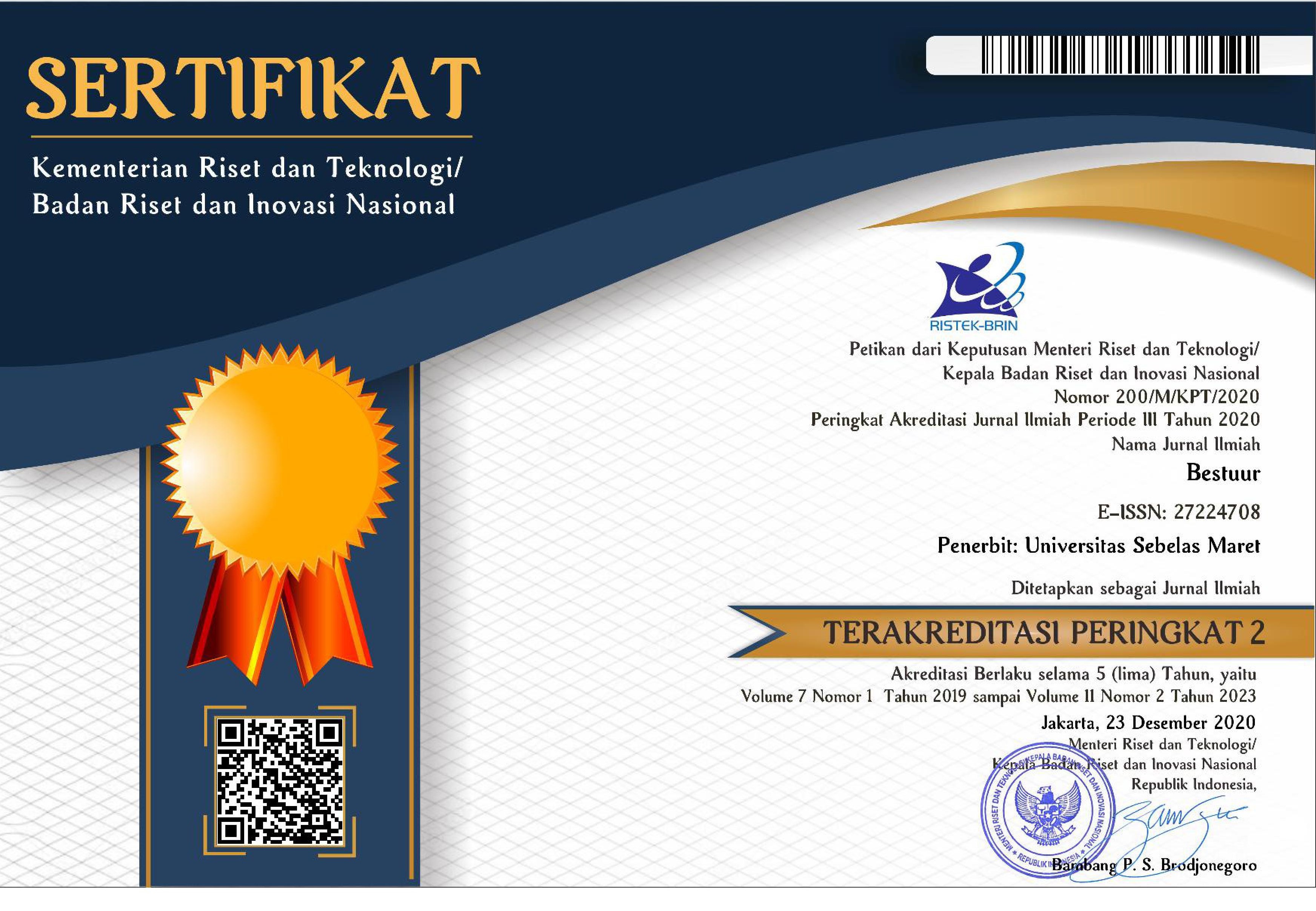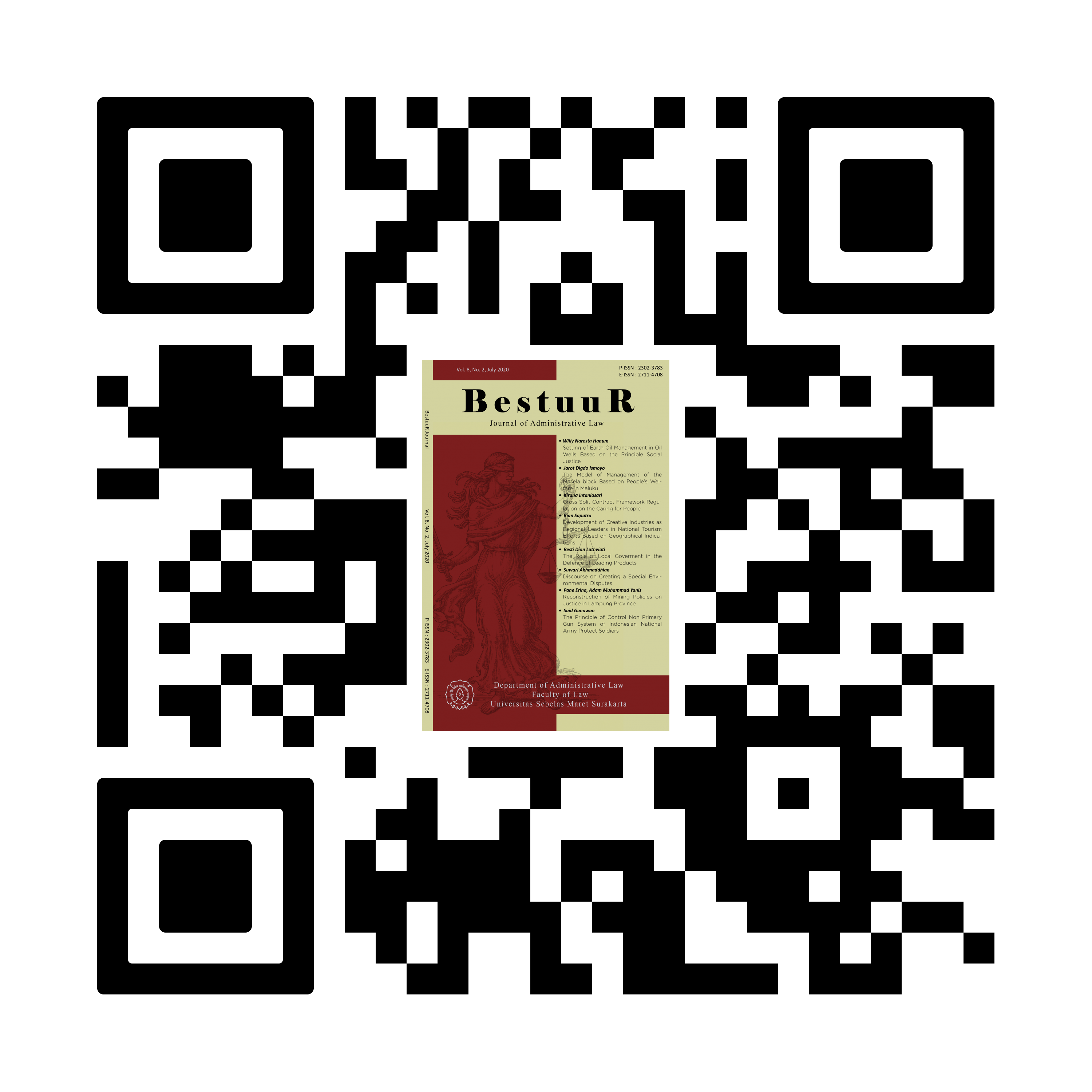Potensi Pelanggaran Pengelolaan Limbah Bahan Berbahaya dan Beracun
Abstract
Abstract
The increasing of the volum and kinds of Hazardous and Toxic Waste (B3) endangered the environment and life so it has been managed well. As a state law, of the Law No. 32/ 2009 of The Protection and Management of the Environment (Law of PPLH) and its derivatives, i.e, Government Regulation No. 101/2014 of the Management of Hazardous and Toxic Waste (B3) and The ministry Regulation No.P 95/2018 of integrated licency of Management of Hazardous and Toxic Waste (B3) with environment licence through the electronically integrated service of a company licence, should fulfill The Law Theory of Law Substance, Law Structure and Law Culture. It also should be able to ensure the legal certainty, justice and expediency. The aims of the research were to analyze The Regulations of Management of Hazardous and Toxic Waste (B3) mentioned above and to describe the violation potential the related Regulations.The result of analysis showed that The Regulations had good law substance and law structure. The good implementation of the Regulations could be expected to bring up a good law culture. The Regulations would be able give the legal certainty, justice and expediency when it was well implemented. The violation potential could be not only from the Law Subject in related to the licensing and supervision but also from the Law Object in related to the abuse of licence anda data manipulation. The violation can be minimized by the licence simplification, the ease of data acces and the increasing of number and quality of supervision. The conclusion of research were that the Regulations related to Management of Hazardous and Toxic Waste (B3) were good of both Law Theory and Law function, but many violation potential to the regulations so it had to be anticipated.
Keywords: Management of Hazardous and Toxic Waste, State, Law Function, Violation potential.
Full Text:
PDFReferences
Abdul Kadir Jaelani, I Gusti Ayu Ketut Rachmi Handayani, Isharyanto, “Regulation of Regional Government on Halal Tourism Destinations in West Nusa Tenggara Province after Constitutional Court Decision Number 137/PUU-XIII/2015”, Proceeding Atlantis Press: Advances in Social Science, Education and Humanities Research, Volume 358, Tahun 2019.
Abdul Kadir Jaelani, I Gusti Ayu Ketut Rachmi Handayani, Lego Karjoko, “Executability of the Constitutional Court Decision Regarding Grace Period In The Formulation Of Legislation”, International Journal of Advanced Science and Technology Vol. 28, No. 15, (2019).
Abdulatti Abdullah Algonin, Ashabani Mohamed Shleag, Gusti Ayu Ketut Rachmi Handayani and Prabang Setyono, “Variation of Environmental Awareness among the Student in Government High Schools in Solo City Indonesia”, International Journal of Applied Engineering Research Volume 9, Number 21 (2014)
Agus Surachman, I Gusti Ayu Ketut Rachmi Handayani and Yudho Taruno, “Effect of Globalization on Establihment of Water Resource Law: A Practice in Indonesia”, International Journal of Economic Research, Volume 14, Number 13 (2017).
I Gusti Ayu Ketut Rachmi Handayani, Adi Sulistiyono, Tommy Leonard, Ardi Gunardi and Fatma Ulfatun Najicha, “Environmental Management Strategy in Mining Activities in Forest area Accordance with the Based Justice in Indonesia”, Journal of Legal, Ethical and Regulatory Issues, Volume 21, Issue 2, 2018.
I Gusti Ayu Ketut Rachmi Handayani, Edi As’Adi, Guntur Hamzah, Tommy Leonard and Gunarto Gunarto, “Relationship Between Energy Consumption in International Market and Indonesia Prices Regulation”, International Journal of Energy Economics and Policy, Vol.7, Issue 5 (2017).
I Gusti Ayu Ketut Rachmi Handayani, I Ketut Seregig, Teguh Prasetyo and Ardi Gunardi, “The Application Of Article 359 Of The Criminal Code In The Investigation Of The Death Of Post-Operative Patients”, Journal of Advanced Research in Law and Economic Vol, 8, Isue 5 (2017).
Lego Karjoko, I Gusti Ayu Ketut Rachmi Handayani and Adi Sulistiyono, “Setting of Plantation Land Area Limitation Based on Social Function Principles of Land Cultivation Rights to Realize Social Welfare-Promoting Plantation, Jurnal Dinamika Hukum, Volume 17 No 1 (2017)
Lego Karjoko, Yulfitri Nurjanah, “The Legality of Freehold Title and Legal Implications Against of Land Makers Officers (The Study of Freehold Title Issuance Number 1576/Nusukan Village, Banjarsari Sub-District, Surakarta City, Central Java)”, International Journal of Scientific and Technology Research 8(10), 2019.
Lusia Savitri Diah Candrasari and Lego Karjoko, “Principle of Social Function of Land Cultivation Right in Agritourism Accommodation in Indonesia”, International Journal of Multicultural and Multireligious Understanding, Vol. 5, No. 2, April 2018.
Rahayu Subekti, Adi Sulistiyono and I Gusti Ayu Ketut Rachmi Handayani, “Solidifying the just law protection for farmland to anticipate land conversion”, International Journal of Economic Research, Volume 14, Number 13 (2017).
Suwari Akhmaddhian, Hartiwiningsih & I Gusti Ayu Ketut Rachmi Handayani, “The Government Policy of Water Resources Conservation to Embodying Sustainable Development Goals: Study in Kuningan, Indonesia”, International Journal of Civil Engineering and Technology, Volume 8, Issue 12, (2017).
Zaidah Nur Rosidah, Diana Zuhroh, Farhan & Lego Karjoko, “Justiceaspect Ofthe Settlement Dispute Insharia Business Through The Religious Court”, South East Asia Journal of Contemporary Business, Economics and Law, Vol. 12, Issue 4 (2017)
DOI: https://doi.org/10.20961/bestuur.v7i2.40414
Refbacks
- There are currently no refbacks.
Copyright (c) 2020 Arif Jumari
License URL: https://creativecommons.org/licenses/by/4.0/
|











_CROSREF.jpg)




